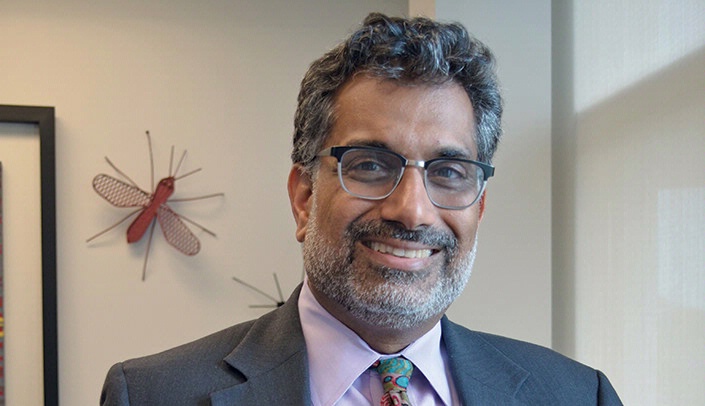EBOLA. SARS. ANTHRAX. MERS. SMALLPOX. PLAGUE. A MULTITUDE OF VIRUSES AND MOSQUITO-BORNE ILLNESSES AND HEALTH HAZARDS IN POST-NATURAL DISASTERS.
Ali S. Khan, M.D., M.P.H., has seen it all.
His travels have taken him to remote villages all over the world, to war zones and to ground zeros where treatments do not exist.
But, since being named UNMC’s College of Public Health dean two years ago, the ultimate disease detective has become the people’s greatest advocate for developing healthy lifestyles and a strong public health infrastructure.
He has crisscrossed the state promoting the idea of making Nebraska the healthiest state in the U.S. – it’s now 10th, according to America’s Health Rankings from the United Health Foundation – and has travelled the country and the world demonstrating UNMC’s expertise in universal health issues.
With his 23 years of experience with the Centers for Disease Control and Prevention (CDC) fighting global infectious diseases, his message is, “if a disease exists somewhere in the world, it can be here within a few hours.”
He should know. Three people who contracted Ebola in Africa were treated at UNMC during the outbreak, during which he was twice called on to help the World Health Organization eradicate the disease in Sierra Leone.
Dangers lay everywhere for the citizens of the world in terms of existing or emerging infectious diseases, Dr. Khan stresses in his new book, “The Next Pandemic: On the Front Lines Against Humankind’s Gravest Dangers,” which came out in May.
Protecting people from these public health emergencies should be seen as no less a core function of government than preventing a foreign army’s invasion, he states in the book.
“Given the endless dance between microbes and humans, we should continue to expect that new pathogens will emerge and existing pathogens will learn new tricks to exploit changes in their environment,” he said.
Wellness begins at home, he believes. It’s the essence of the healthiest state challenge. The college’s faculty has embraced it by engaging in a series of collective impact projects with their community partners and initiating research projects to:
- Reduce binge drinking (Nebraska ranks 47th)
- Reduce obesity rates (29th)
- Improve adult immunization rates (41st)
- Reduce health disparities (43rd)
- Decrease unnecessary hospital readmissions (26th)
- Lower heart disease (15th)
- Decrease smoking (20th)
Climate change, decreasing the number of uninsured people in the state (17th) and increasing state public health funding (22nd) also are priorities for Dr. Khan.
“We must build preventive measures directly into the infrastructure of our communities to make them resilient. We can’t wait for the next disaster to hit,” he said.
“And we will see if Louis Pasteur was right when he said, ‘Gentlemen, it is the microbes who will have the last word.'”
Web Extra
Listen to Dr. Khan talk about Zika.
